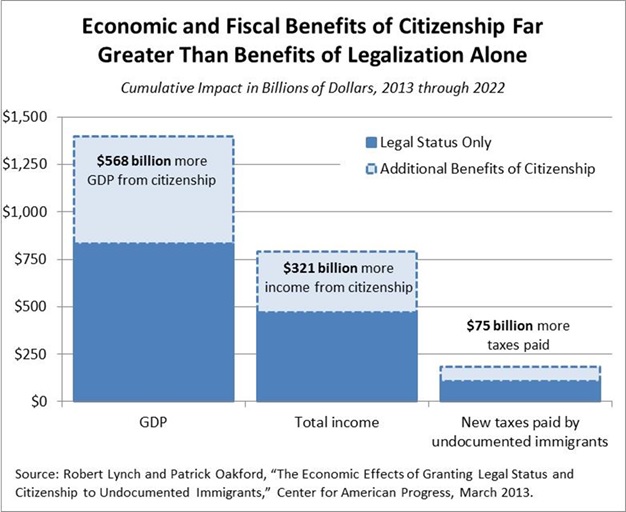
The White House released a report detailing the economic benefits of providing a path to earned citizenship for the 11 million undocumented immigrants currently living and working in the U.S. shadow economy. As highlighted in the report, a range of economic research has shown that immigrants living and working in the United States without authorization are earning far less than their potential, paying much less in taxes, and contributing significantly less to the U.S. economy than they would if they were given the opportunity to gain legal status and earn U.S. citizenship. According to outside estimates, providing earned citizenship for these workers would increase their wages and, over 10 years, boost U.S. GDP by $1.4 trillion, increase total income for all Americans by $791 billion, generate $184 billion in additional state and federal tax revenue from currently undocumented immigrants, and add about 2 million jobs to the U.S. economy.
A strong majority of Americans from diverse states and political backgrounds support a path to earned citizenship. However, some in Congress have suggested that immigration reform should provide only legal status, without any opportunity for those who are getting on the right side of the law to earn their way to citizenship. This “legalization-only” approach violates a basic principle of our country: that anyone, no matter where they came from, can become an American citizen if they’re willing to work for it and take on the responsibilities of citizenship. We cannot afford a system that creates a group which can never become fully American, denying equal rights to people who pay the same taxes and play by the same rules even after they've paid a penalty and gotten on the right side of the law.
And in addition, the research shows the significant economic costs – in terms of lost growth, earnings, tax revenues, and jobs – associated with failing to provide a path to earned citizenship for these families. Compared to the benefits of citizenship, providing legal status alone to currently undocumented workers would, over 10 years, result in $568 billion less GDP, and $321 billion less total income. An estimated 820,000 fewer total jobs would be created, and federal and state governments would lose out on $75 billion in additional tax revenue according to outside estimates.

There are likely a number of factors that explain why citizenship provides even greater wage and economic benefits than legalization alone, including jobs and licenses people are only eligible for as citizens; jobs that require travel, which is often easier for those with U.S. passports; and citizenship serving as a signal to employers that a person means to stay in the U.S.
The largest factor, however, may be the less tangible one: greater certainty that accompanies citizenship leads to more investment, for example, in education and training, or more willingness to take the risk of starting a business.
The bipartisan Border Security, Economic Opportunity and Immigration Modernization Act (S. 744) passed by the Senate is an opportunity for our country to finally fix its broken immigration system. This commonsense legislation, drafted and supported by both Democrats and Republicans, has four pillars: (1) continue to strengthen our borders; (2) crack down on companies that hire undocumented workers; (3) hold undocumented immigrants accountable before they can earn their citizenship by requiring them to pass background checks, pay penalties and their taxes, learn English, and go to the back of the line; and (4) streamline the legal immigration system for families, workers, and employers.
Economists, business leaders, and American workers agree – we must take advantage of this historic opportunity to fix our broken immigration system in a comprehensive way. To this end, the President urges the House of Representatives to take action and stands willing to work with all parties to make sure that commonsense immigration reform with an earned path to citizenship becomes a reality as soon as possible.



